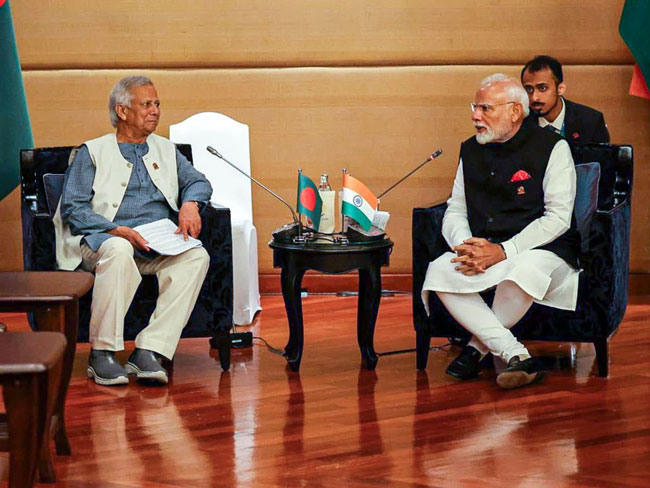Desk:India has expressed deep concern over Bangladesh’s recent trade policies and statements. However, despite this, the Indian government has indicated that it will try to avoid immediate retaliatory actions to prevent further deterioration of bilateral relations. India has made it clear that it does not want to engage in any kind of trade war with Bangladesh, even though Dhaka’s trade-related signals have not been positive. Recently, Bangladesh imposed a ban on the import of yarn from India via land borders. This move follows India’s decision in 2020 to withdraw a transshipment facility previously granted to Bangladesh. However, Indian government sources have clarified that the decision to revoke the transshipment facility was aimed at reducing congestion at Indian ports and airports.
India has ensured that this decision will not affect exports from Bangladesh to Nepal and Bhutan, which pass through Indian territory. Amid the growing number of anti-India statements and trade decisions from Bangladesh, Indian Prime Minister Narendra Modi met with Bangladesh’s Chief Advisor Mohammad Yunus in Bangkok. During the meeting, Modi urged Yunus to avoid making statements that could worsen the atmosphere between the two countries.
Closure of Transshipment Facility
The Indian side believes that even before the closure of the transshipment facility, Bangladesh’s interim government had been taking steps that could damage trade relations between the two countries. In March, Bangladesh decided to close three land borders with India and impose a ban on yarn imports. Earlier in January, Bangladesh had announced tighter surveillance at the Benapole Customs House, which India saw as a restrictive move.
Bangladeshi textile manufacturers had already warned the government that banning yarn imports from India would be detrimental to the export industry. India exports raw materials such as cotton yarn to Bangladesh for textile production, and this ban directly impacts the industry.
Bangladesh Strengthens Ties with Pakistan
While Bangladesh is moving towards restricting trade with India, it has also started direct trade with Pakistan. In February, Bangladesh decided to purchase 50,000 tons of rice from Pakistan through the Trading Corporation of Pakistan (TCP).
Indian officials have become increasingly concerned as these developments coincide with rising signs of extremism in Bangladesh and its growing closeness with Pakistan, which is seen as a global center of terrorism by India.
Sources say that Pakistan is now looking for opportunities to increase exports to Bangladesh. After years of stalled high-level talks, Pakistan’s Foreign Secretary Amina Baloch is set to visit Dhaka on Thursday, and Foreign Minister Ishaq Dar will visit Bangladesh next week.
India has made it clear that it seeks stability and cooperation while keeping trade separate from politics, but it remains cautious about Bangladesh’s policies and its increasing ties with Pakistan. In the coming weeks, it will be important to observe how Dhaka’s policy evolves.
India’s Strategy: Patience and Caution
India has expressed a desire to avoid a trade war with Bangladesh. Government sources say that India values the historical, political, and economic relations between the two countries. In 2023-24, bilateral trade amounted to $12.9 billion, with India granting Bangladesh unilateral duty-free access on several products.
A spokesperson for the Ministry of External Affairs said, “India is committed to promoting regional cooperation and connectivity, but these facilities are provided based on national security and mutual respect.” Experts believe that India’s approach sends a message to Bangladesh that it will not tolerate one-sided hostile actions but also wishes to avoid escalating tensions further.
Regional and Global Context
These developments come at a time when global trade tensions are rising. The United States has recently imposed retaliatory tariffs on several countries, including India and Bangladesh, which has complicated regional trade. Additionally, Bangladesh’s growing ties with Pakistan are a concern for India. The upcoming visits of Pakistan’s Foreign Secretary Amina Baloch and Foreign Minister Ishaq Dar to Dhaka have further fueled speculation regarding these developments.




